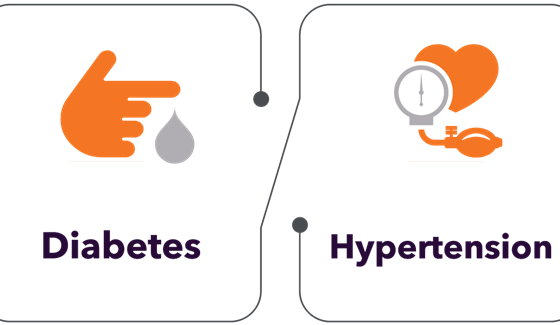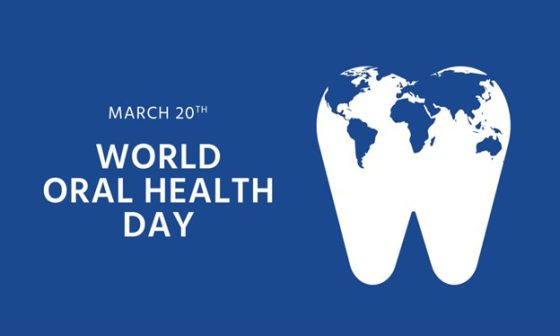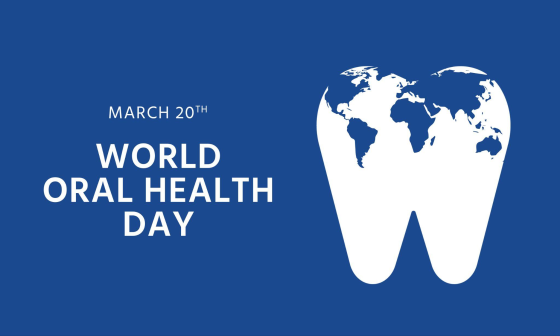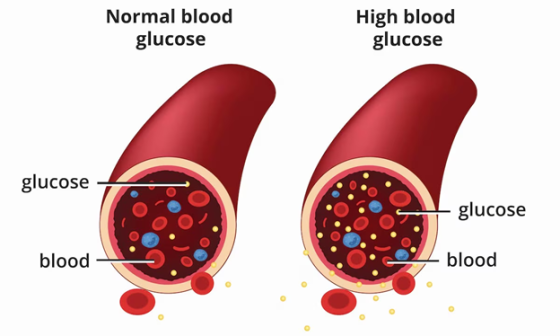Introduction
Dental Caries, also referred to as cavities or holes are often present on teeth and are brought on by tooth decay. They happen when the hard outer coating of your teeth, known as enamel, is attacked by acids produced by oral bacteria.

Source: Adobe Stock
Dental caries is a prevalent dental condition affecting both children (primary teeth) and adults (permanent teeth), as over 90% of adults aged 20-64 years in Nigeria have caries. You may currently have a hole in one of your teeth and may not know because it begins rather slowly often showing no symptoms until it becomes symptomatic. The main culprit for dental caries is acids produced by oral bacteria that cause demineralization and damage to the hard tissues of teeth (enamel and dentine). We understand that maintaining good oral health requires an understanding of dental caries, its causes, prevention, and treatment.
Development of Dental Caries
The tooth and the oral cavity of adults are often filled with micro-organisms often living in a commensal relationship, as at today there are over 600 organisms that make up the oral flora. Dental caries is a condition that begins when carbohydrates and sugars are consumed and left for a long time on your tooth surface. Time is a crucial part of development as the organisms living in the oral cavity need to break down complex sugar present on the tooth surface to initiate the cavity.
If carbohydrates and sugar consumed are immediately removed from the tooth surface the cycle will be destroyed but if left on the surface- demineralization (breakdown) of teeth minerals occur which leads to holes that can be visualized over time.
Demineralization of enamel, the hard outer coating of the tooth, occurs when acids are made by bacteria that consume carbohydrates and sugars. If caries/demineralization of enamel and dentin is left untreated it results in discomfort, infection, and even tooth loss.
Causes of Dental Caries
- Bacteria: Acids that break down tooth enamel are produced by certain bacteria that are naturally present in the mouth. Lactobacillus and Streptococcus mutans are the main bacteria at play.
- Sugar and Carbohydrates: The germs that cause decay are fed by the frequent ingestion of sugary meals and beverages. Sticky foods such as pastries, candy, biscuits, and soft beverages are especially bad.
- Poor Oral Hygiene: When teeth are not sufficiently brushed and flossed, plaque, a sticky film of bacteria, accumulates and causes tooth decay and acid production.
- Lack/low fluoride: Fluoride strengthens enamel’s remineralization and increases its resistance to acid from bacteria in the oral cavity. Caries risk is increased by a fluoride deficiency, which is frequently caused by inadequate use of fluoridated toothpaste or water.
- Dry Mouth (Xerostomia): Certain conditions and medications such as anti-hypertensives can decrease saliva flow. Saliva is an important natural protection against acid-causing bacteria present in the mouth as it helps wash away food particles and neutralize acids. Decay risk may rise with conditions or drugs that decrease salivary flow.
Symptoms of Dental Caries
Initially, caries are asymptomatic and can go unnoticed by untrained eyes, however, early detection of dental caries usually occurs in the dental clinic if you visit your dentist regularly, early detection can stop additional damage from occurring.
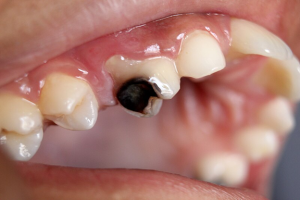
Source: Wikipedia
Symptoms include:
- Tooth sensitivity: Sensitivity ( shocking sensation) or pain when consuming hot, cold, or sweet meals.
- Visible Pits or Holes: Tiny dark patches or holes on teeth.
- Bad Breath: A pronounced bad breath from the mouth, frequently caused by decay especially when food packs in the hole and that food is left for hours.
- Toothache: The final symptom is usually a chronic, sometimes throbbing or sharp pain that disturbs daily activities like sleeping and eating.
- Swelling: When the infection spreads from the tooth to the bone or anatomic sites, there could be obvious facial asymmetry. This is life-threatening and should be managed immediately.
Management of Dental Caries
The severity of the caries determines the management/ treatment for it and it is determined by the dentist. Choices/ options consist of:
- Fillings: The dentist will remove the decayed portion of the tooth and fill the space with tooth-coloured material if the cavity has advanced but is not too serious.
- Crowns: To restore the tooth’s shape and function if the decay is severe and the damage extensive, a crown may be placed over it.
- Root Canal: In cases when caries have progressed to the pulp (blood vessels and nerves) of the tooth, a root canal may be required to remove the affected tissue halting the spread of the infection.
- Tooth extraction: If the situation is serious, the tooth may have to be taken out. In situations where the tooth is too damaged to be repaired, extraction can be your only choice to stop the problem from getting worse. After extractions replacements such as dentures, crowns, bridges, and implants can be discussed.
Prevention of Dental Caries
You may ask “How can I avoid dental caries and its associated discomfort and costs?’ Here are a few successful tips:
- Floss and Brush Often: Brush your teeth at least twice daily; first in the morning and second before you go to bed. Use fluoride-containing toothpaste to brush your teeth at least twice daily, and floss after every meal to eliminate food particles and plaque.
- Reduce Sugar Intake: Eat fewer sweetened meals and beverages. Choose a balanced diet high in fruits, vegetables, and whole grains. This can help prevent caries and other chronic conditions that affect your systemic health like hypertension and diabetes.
- Visit the Dentist Regularly: The recommendation is to visit your dental care provider every six months or at least once every year. These dental visits are not exclusive to adults; immediately after a child erupts a tooth, they become eligible for dental visits. During these visits, routine cleanings and examinations with a dentist are done so that serious damages can be avoided if caries are detected early.
Conclusion
Dental caries is a preventable and treatable condition. You may drastically lower your risk of getting cavities by being aware of its causes, and symptoms and practising good dental hygiene.
Be proactive and knowledgeable about dental care to safeguard your smile and general health. Maintaining dental health and taking care of any problems before they get worse requires routine dentist visits. Wellahealth offers affordable health coverage that can help with your visits. Contact us today!
Recall that having a healthy mouth leads to a healthy body. Share this with friends and family.
Dr. Ifeoma M. Uduh

